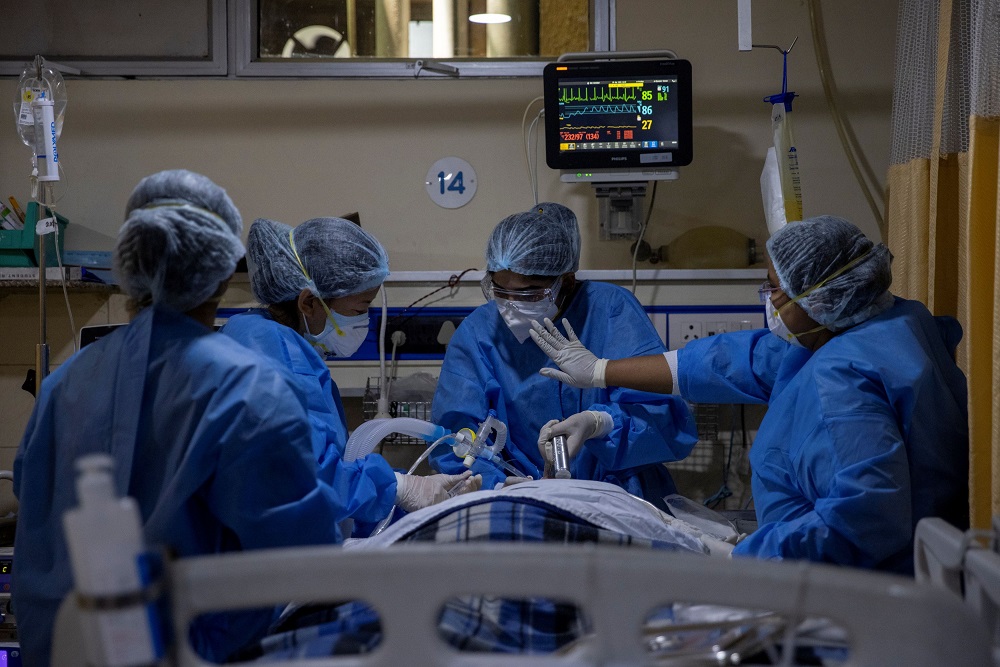SINGAPORE, April 30 — The Indian community in Singapore is grappling with a sense of anxiousness and helplessness as they watch the Covid-19 cases soar to record numbers in their home country.
Those with family in India told TODAY about the constant worry they feel for their loved ones back home, with all saying that they have heard of family and friends contracting the coronavirus as the second wave wreaks havoc across India.
The South Asian country’s total number of cases has surpassed the 18 million mark, setting another world record for new daily infections with close to 380,000 new cases on Thursday (April 29), as the country struggles with a shortage in hospital supplies and overwhelmed morgues.
The worsening crisis has led to several countries, including Singapore, imposing travel restrictions on travellers from India.
Last week, the Singapore Government barred all long-term pass holders and short-term visitors with a recent travel history to India.
Split families, mental stress
The crisis has split families apart, with no light in sight of a reunion any time soon.
For Deeraj Reddy, a 32-year-old software engineer, it has been 10 months since he saw his first-born.
Reddy, an employment pass holder, had returned to the southern Indian city of Hyderabad in India with his wife in December 2019 for the delivery of his first child.
He chose to return to Singapore first in July last year because he felt it was unsafe for his wife and daughter to travel during the height of the pandemic.
He had hoped that they could return when the pandemic “settled down”, yet entry approvals have been controlled for dependent pass holders such as his wife.
The latest restrictions on travellers from India has thrown another spanner in the works for Mr Reddy, who said that it was “mentally stressful” for him to be away from his family in India given the surging cases.
“Even if we are here and working, some part of our brain is constantly thinking about what’s happening over there, whether they are safe, and how they can come back here or when I can go back,” he said.
Likewise, Anik Naha Biswas, a postdoctoral student at Nanyang Technological University, said that it was mentally distressing to learn of friends contracting the virus and hear of negative news on social media such as insufficient medical supplies in India.
The 25-year-old’s worry is doubled because he is away from his grandparents who are susceptible to the virus.
Fighting helplessness
For some, being away from their family during this period has left them with a sense of helplessness.
Rajesh Chopra, a Singapore citizen with family in Delhi, one of the harder-hit states, said that his sister informed him that she had Covid-19 only about two weeks after recovering to avoid worrying him.
However, it left him anxious knowing that he could not do anything about the situation.
The 53-year-old, who is the chief financial officer of a multinational company, has tried to provide psychological support for his family by calling them daily and making small talk to take their mind off the worsening situation in India.
Others, such as Virat Chopra, are trying “not to give in to the helplessness” by raising awareness of the situation in India instead.
The 25-year-old investment banker whose family is also in Delhi said that he has been sharing information on his social media accounts such as posts by friends who need oxygen supplies or beds.
The employment pass holder said that by doing so, he hopes to link people who do not have the resources with those who do within his networks.
Some not too worried, yet
At the same time, some among the Indian community here said that they were not too worried yet because the situation in their hometowns has remained manageable.
Veeraiyan Hariprasath, a 28-year-old maintenance worker, said that the outbreak in his hometown in the southern city of Thanjavur did not appear to be as bad as other big cities.
Hariprasath, who stays in a dormitory in Singapore, said that his parents are more concerned about his well-being here than their own situation given the Covid-19 outbreak in dormitories last year.
Similarly, Atin Ghosh, 32, an intern at a autonomous car company, said that Covid-19 has not spread much in his hometown yet, which is near the eastern Indian city of Kolkata.
However, he believes that the “worst is yet to come” given that elections involving big gatherings recently concluded. He has prepared information on medical resources in his locality in case of an emergency.
Supporting each other
In some ways, the crisis has rallied the Indian community here to offer support for each other, some people observed.
Reddy said that many chat groups on WhatsApp and Telegram have appeared.
People in these groups, who are from different states, were responsive in offering help to others, such as providing evacuation flights schedules or explaining documents required for travel.
Those interviewed said that sooner or later, though, the pandemic will force some of them to make difficult decisions.
For Reddy, who has had to watch his daughter grow up through a mobile phone screen, he will have to rethink his future plans if the pandemic does not improve.
“No one knows when the pandemic will end or how long the restrictions will be in place. If it goes on for six months, I can’t be away from my family for so long. It’ll be too much.” ― TODAY






















